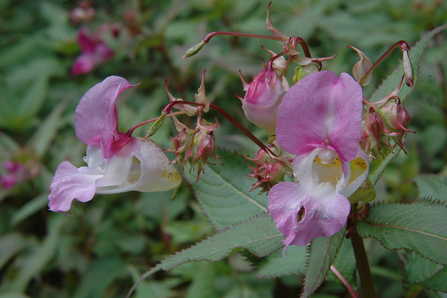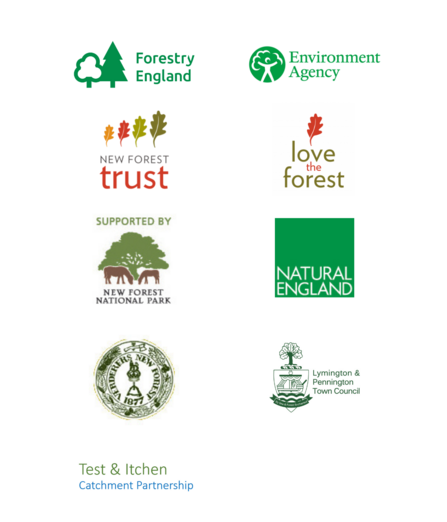New Forest Non-Native Plants Project
The New Forest Non-Native Plants Project is a partnership project, hosted by Hampshire & Isle of Wight Wildlife Trust, which aims to stop the spread of invasive non-native plants in the New Forest area, particularly along water courses and in wetland habitats. The Project Officer, Catherine Chatters, liaises with landowners and land managers to control invasive non-native plants at the catchment scale with the help of volunteers and professional contractors.
Since its launch in 2009, the Project has tackled a wide range of invasive non-native plants including Himalayan balsam, giant hogweed, Japanese knotweed, American skunk cabbage and parrot’s feather. These plants were all introduced to the UK as ornamental garden plants but have ‘jumped the garden fence’ and invaded the countryside, causing environmental, economic or social problems. They grow vigorously, spread rapidly and damage the environment by out-competing our native wildflowers. Many invasive non-native plants are aquatic, spreading when seeds or fragments of vegetation are carried downstream and causing harm by choking watercourses and blocking out the light.

Himalayan balsam © Ashley Basil
The New Forest Non-Native Plants Project aims to:
- find out where non-native plants occur in the New Forest area;
- offer landowners and land managers advice and practical help to control invasive non-native plants;
- undertake and commission research relating to invasive non-native plants;
- raise awareness about invasive non-native plants and the problems they cause.
The New Forest Non-Native Plants Project works closely with the Great Britain Non-native Species Secretariat and helps to implement the Great Britain Invasive Non-Native Species Strategy 2023 to 2030 (February 2023)
Calmore Guides pulling Himalayan balsam along the Cadnam River © Catherine Chatters
How you can help stop the spread of invasive non-native plants...
- Report your sightings to Catherine Chatters on 07770 923315 or Catherine.Chatters@hiwwt.org.uk.
- If you are interested in volunteering please contact Catherine Chatters on 07770 923315 or Catherine.Chatters@hiwwt.org.uk.
- Volunteer with a work party to pull up Himalayan Balsam during the summer– the plants have short roots and are easy to pull out and your efforts can make a practical contribution to the conservation of wildlife. If you are interested please get in touch with Catherine Chatters on 07770 923315 or email Catherine.Chatters@hiwwt.org.uk.
- Download the Plantlife booklet ‘Keeping ponds and aquaria without harmful invasive plants: A guide to plants you can use in place of non-natives’.
- Find out how to Be Plant Wise. Be careful not to buy invasive non-native plants for your garden or garden pond and make sure that you dispose of any surplus plants carefully.
- Landowners and land managers may be able to receive advice and practical help to control invasive non-native plants. Please contact Catherine Chatters on 07770 923315 or email Catherine.Chatters@hiwwt.org.uk for information.
New Forest Non-Native Plants Project (https://vimeo.com/74363237)
This 17 minute film was produced, filmed and directed by Sophie van der Meeren and Joe Constable of www.uniquewaves.com.
Project Reports
Project Partners
The New Forest Non-Native Plants Project is a partnership between Hampshire & Isle of Wight Wildlife Trust, the Environment Agency, Forestry England, Natural England, the New Forest National Park Authority and The Verderers of The New Forest.
Hampshire & Isle of Wight Wildlife Trust was a partner in the New Forest ‘Our Past, Our Future’ Landscape Partnership Scheme which, funded by the National Lottery Heritage Fund, supported the work of the New Forest Non-Native Plants Project.
Hampshire & Isle of Wight Wildlife Trust is grateful for financial support to the New Forest Non-Native Plants Project from the Environment Agency, the New Forest Higher Level Stewardship Scheme, Forestry England, the New Forest National Park Authority’s Sustainable Communities Fund, Natural England, the New Forest Trust’s ‘Love the Forest’ grant scheme, Lymington and Pennington Town Council and the Test & Itchen Catchment Partnership, supported by Southern Water.

